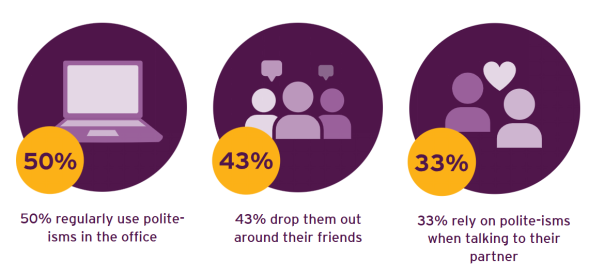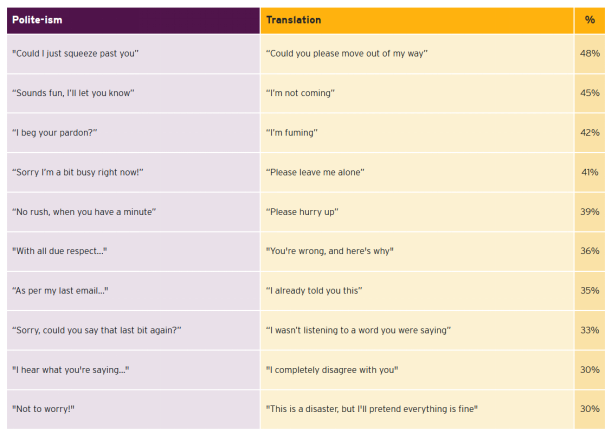- Home
- Various Articles - Skills - Listening and Speaking
- New Research Explores British ‘Polite-isms’ and Their Impact on Communication
New Research Explores British ‘Polite-isms’ and Their Impact on Communication
Dr Ben Beaumont is English Language Teacher Strategy and Publishing at Trinity College London, an international, charitable awarding organisation. In this role, Ben oversees the academic governance and development of Trinity’s teaching qualifications as well as providing pedagogic guidance for Trinity’s non-assessment work with learners and teachers. Contact: https://www.trinitycollege.com/contact
Editorial
Part of the text was originally published On Trinity College Website here. The research of 400 specialist EFL teachers was commissioned by Trinity College London and conducted by GK & Partners during March 2025.
The research
A new survey has uncovered significant challenges in teaching politeness strategies to English language learners, with 52% of teachers reporting that students find these crucial communication skills "difficult to use in real-time conversation".
Recently, Trinity College London released new research exploring the role of ‘polite-isms’ in British English - those indirect expressions used to soften requests, avoid conflict, and navigate social interactions. The story was widely covered by British media including The Times, Daily Telegraph and Daily Mail.
Trinity College London has released new research exploring the role of ‘polite-isms’ in British English - those indirect expressions used to soften requests, avoid conflict, and navigate social interactions.
Trinity experts are committed to ongoing research that ensures our qualifications reflect real-world authentic communication. This study is part of a wider programme - one that informs English language syllabuses, assessments, and teacher training, helping learners and educators navigate the complexities of communication.
Dr Ben Beaumont, Head of English Language Teacher Strategy & Publishing at Trinity College London commented “At Trinity, we draw on specialist insights and ongoing research like this to also provide targeted support for teachers and learners worldwide, developing not only their linguistic accuracy but also their practical competence. And by choosing the right qualification for their need, learners can study towards, and gain, the communication skills they need to succeed in their aspirations for life, study, and work. Our approach ensures that learners are not only prepared for exams but also empowered to navigate a diverse range of situations with confidence.”
Why does this matter?
Language is far more than just words or grammar – it reflects culture, values, and social expectations. For learners of English, understanding indirect communication and pragmatic competence is essential for building confidence in real-world interactions, whether in study, work, or everyday life.
According to our research:
- 83% of people in the UK surveyed say they avoid confrontation at all costs
- 46% of respondents admitted that they use polite-isms to be nice and avoid any unnecessary tension.
- 27% of English language teachers say that English language students find the indirect style of British people confusing

Key findings
Cultural competence – The study highlights the importance of understanding indirect communication in British culture, how politeness shapes interactions, and how this can be challenging for learners of English.
Preparing learners for study, work, and life: Understanding indirect communication is essential for navigating academic, professional, and everyday interactions. This research highlights how mastering British politeness norms supports learners in feeling confident and culturally competent in real-world settings.
The role of digital and AI-driven communication: From streaming platforms to AI-powered assistants, learners today encounter diverse models of English. Our research explores how digital exposure influences language acquisition and how educators can help learners develop pragmatic competence across different communication contexts.
Confidence in communication – By recognising common patterns of indirect language, learners can respond more appropriately in personal, academic, and professional settings.

Implications for learners
- 35 percent of English teachers surveyed say that global streaming networks have helped to improve students' understanding and use of British polite-isms.
- 19 percent deem learning polite-isms as a necessary part of learning the language.
- Only 5 percent of learners embrace the nation’s indirect communication styles enthusiastically
- Only 5 percent of learners appear to appreciate the communicative importance of the UK’s indirect communication styles.
Follow-up
To follow up this study, Trinity carried out complementary research of 400 EFL teachers, research which highlighted an implementation gap between recognising the importance of politeness strategies and successfully teaching them in classroom settings.
Despite near-universal agreement on their value - 98% of EFL teachers rated teaching authentic politeness expressions as either "very important" (68%) or "moderately important" (30%) - teachers reported specific challenges in classroom implementation, with 52% noting that students find these expressions "difficult to use in real-time conversation".
"Understanding the characteristics of any culture’s forms of communication including politeness, is essential for successful language instruction.” said Dr. Ben Beaumont, Head of English Language Teacher Strategy & Publishing at Trinity College London.”
“For example, 'I'll think about it' can also mean 'no’ and 'sorry' might not actually be an apology.”
Trinity’s research suggests that teachers who embrace these cultural nuances, often with a touch of humour about how such polite-isms are deployed, can effectively support the development of their students' pragmatic discourse skills.
“Our ability to laugh at our own communicative quirks can create wonderful opportunities for effective learning", added Dr Beaumont.
The survey also revealed a contrast between teaching simple politeness expressions and more complex strategies. While nearly 87% of respondents teach basic polite expressions (such as "please", "could" and "would"), only about a third incorporate more sophisticated elements such as pragmatic particles (35%) or hedging expressions (23%), suggesting some teachers may benefit from more politeness-themed resources to help learners develop more authentic ‘real world’ British English.
On the student side, the challenges are equally pronounced. More than half of teachers (52%) identified understanding sarcasm or irony in polite phrases as the greatest obstacle for learners, followed by mastering appropriate intonation (43%) and recognising indirect refusals (41%). Only 5% of teachers reported that students "generally embrace politeness strategies enthusiastically", while 34% observed "mixed reactions" and nearly 20% noted that students "generally find them difficult to master".
Teachers reported various student reactions to indirect communication styles, with 27% noting that learners find these styles confusing, 23% reporting students consider them unnecessarily complicated, and 31% observing that students struggle to recognise when to use polite forms.
Digital communication also appears to be changing how students communicate, with 50% of teachers observing that messaging apps, social media, and emails have made students "more direct and less likely to use British politeness patterns".
Assessment practices show strong support for politeness evaluation. A significant 94% of teachers consider assessing politeness strategies either "very important" (47%) or "moderately important" (47%). This widespread recognition highlights the growing awareness of evaluating pragmatic competence alongside traditional language skills.
Concluding remarks
"The findings demonstrate both the recognised importance of politeness strategies in language acquisition and the real-world challenges teachers face in diverse classrooms," Dr. Beaumont added.
"Addressing these implementation challenges through specialised training and culturally sensitive resources is essential for advancing effective language education in our increasingly interconnected world.
"As a leading English language assessment provider, Trinity is focussed on this by ensuring our qualifications and syllabi place authentic, real-world communication at their core. We're developing assessment frameworks that evaluate pragmatic competence alongside traditional language skills, helping teachers prepare students for genuine communicative success beyond test performance."
Listening Beyond Audio: Multimedia Design to Support ESL Listening Comprehension
Abeer Ali Al Owaisi, Sultanate of OmanNew Research Explores British ‘Polite-isms’ and Their Impact on Communication
Ben Beaumont, UKAccent or Acting? Our Ability to Spot a Fake
Nigel Balfour, UK